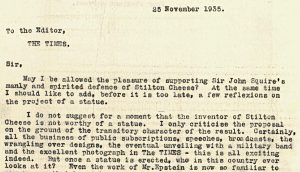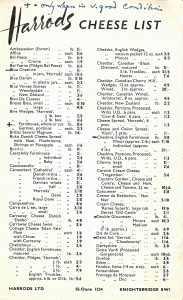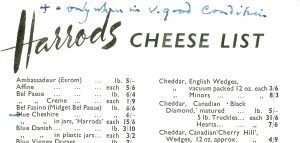Included in the latest volume of the Letters of T. S. Eliot is a letter to the Editor of the Times entitled ‘Stilton Cheese’, written on 25 November 1935 and published a few days later. Eliot is replying to a letter from poet and literary editor J. C. Squire and his ‘spirited defence of Stilton Cheese’. An expert on the cheese, Squire was heading up the Stilton Memorial Committee and had proposed the erection of a statue of the inventor of the Stilton – a Mrs Paulet of Wymondham. While Eliot could see the worthiness of a statue, he questioned whether anyone would bother to look at it – ‘In a few years’ time the Stiltonian monument would be just another bump in a public place, no more inspected than the rank and file of statesmen, warriors, and poets.’ Instead, Eliot suggested the formation of a Society for the Preservation of Ancient Cheeses in a bid for cheese to be ‘brought back to its own in England’ (The Stilton Cheesemakers’ Association was formed the following year in 1936). Part of the role of the Society would be to ‘visit all hotels and inns in Gloucestershire, demanding Double Gloster’. Ending his letter, Eliot confesses a greater love for the ‘noble old Cheshire’ which beats even the finest Stilton when in ‘prime condition’.

Eliot received several letters in response to his letter to the Times. In reply to medieval historian G. G. Coulton, Eliot acknowledges Coulton as the originator of the project for a Society for the Preservation of Ancient Cheese and comments on the recent decline in the quality of Wensleydale, ‘that great cheese’, which he believes to have been taken over by the Rowntree family. After a lapse in correspondence, Eliot’s banking friend J. D. Aylward was prompted to write – he was concerned Eliot’s cheese tastes were too narrow and nationalistic and over nearly two sides of paper imparts his own wisdom on the subject. Among his recommendations is the little lunch room at the Grosvenor in Chester – the place to enjoy Cheshire ‘as it should be’. In reply, Eliot suggests cheeses Aylward should try – Fressingfield, the Bayerische Beerkäse and the Gammel Ost – ‘the Mount Everest of cheeses … made of reindeer milk and then stored for years under the beds of Norwegian farm folk.’ Eliot is glad too to learn of a new cheese from Aylward (Chabichou) – ‘but a part of the reason for living is the discovery of new cheeses.’
Eliot’s appreciation of cheese did not go unnoticed by his friends and acquaintances. In his book, The Pound Era, Hugh Kenner recalls Eliot the joker with a tale of a particular Eliot-cheese encounter when the two men lunched together at The Garrick Club in November 1956. Eliot fancied ‘a fine stilton’ and after ordering he confided in his companion: ‘Never commit yourself to a cheese without having first … examined it’. Eliot ‘the Critic’ proceeded to examine the Stilton by tapping it and digging about, eventually declaring the cheese ‘Rather past its prime’ and unable to recommend it. Eliot prodded his way through the cheeseboard (sans Stilton), eventually landing on ‘An Anonymous Cheese’ which could not be identified by any of the Garrick staff and which, after careful examination, he ate in its entirety. Eliot had been ‘digging about’ in cheeses for a good twenty years – J. D. Aylward wrote (in the same letter mentioned above) ‘I can see in my mind’s eye the real joy with which you dig into the middle of a real ripe Stilton’. Sharing a cheeseboard with T. S. Eliot must have been quite a thing.

Aside from the letters and published anecdotes, the archive contains a small testament to T. S. Eliot the Cheese Connoisseur – an annotated cheese list from Harrods (c.1957–1964). Eliot has marked the cheeses he would like, including two types of Cheshire, a Double Gloucester, Port du Salut, a Swiss Emmental Gruyère and, of course, a blue Stilton, and has asterisked those cheeses to be included ‘only when in v. good condition’. Over twenty years since his letter to the Times Eliot is still enjoying a Cheshire, a Double Gloucester and a Stilton.



